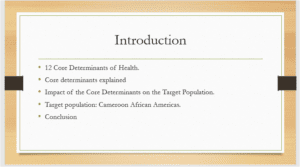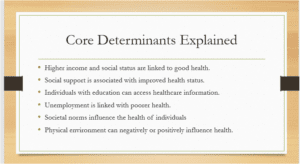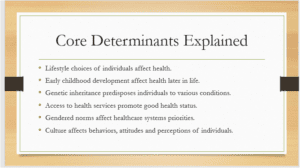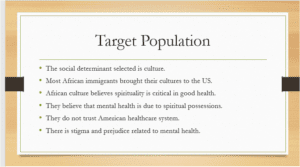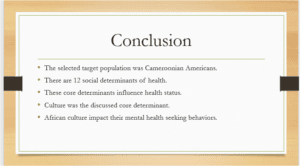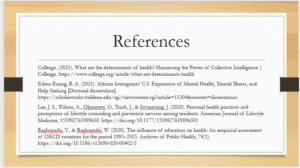Core Determinants of Health and Their Impact on Cameroon African Americas
Hello, and welcome to this presentation on the core determinants of health. Here is an outline of the presentation. I’ll first identify the 12 Core Determinants of Health; I will then explain how each of the Core Determinants influences the health of a population. I’ll then explain how one selected Core Determinants of Health impact the health of my selected target population and particularly the mental health beliefs of the population. My selected population will be Cameroon African Americans. Lastly, I’ll conclude the presentation by restating the key points. I hope you enjoy the discussion.
According to Colleaga (2021), there are 12 core determinants of health. They include Employment, education, physical education, biology, financial, personal health services, gender, health services, social environments, child development and gender. These factors contribute to individual and community health, and they can be modified to increase health and wellness. These factors are influenced by circumstances, environment and genetics. Community and individual health are determined by many interrelated factors, which include lifestyles. Some of these factors can be influenced, while others are difficult to control. The Healthcare delivery industry can achieve better healthcare outcomes more cost-effectively by focusing more on primary healthcare and public health to build more healthy communities and social supports.
According to Colleaga (2021), higher social status and income are associated with enhanced health status. Numerous studies have shown that individuals with higher incomes have a higher life span than those with lower incomes. Second, social support from families and friends is associated with improved health status. Individuals with social support have emotional reassurance and support for practicing better healthcare practices.
Second, according to Raghupathi & Raghupathi (2020), education status is linked with better health outcomes. Higher educated individuals can access healthcare information and hence practice better healthcare behavior.
Third, according to College (2021), unemployment and an unsafe work environment are linked to poor health. Individuals with fewer stress-related works live longer compared to those with riskier jobs. Social responses can enhance the coping strategies of individuals to foster good health. Additionally, societal norms influence the health behaviors of individuals. Similarly, the physical environment can negatively or positively influence health. Factors related to air quality, safe houses, and water quality contribute to the health status of individuals.
According to Lee et al. (2020), individuals can promote self-care and have lifestyle choices to enhance their health. Personal choices can be influenced by socioeconomic and environmental factors. Additionally, early childhood development affects health later in life, and the other social determinants of health also affect childhood development (Colleaga, 2021). Furthermore, the genetic makeup of an individual is a fundamental determinant of health, and genetic inheritance predisposes individuals to a wide range of health conditions that affect their health status (Colleaga, 2021). Similarly, access to healthcare services promotes health and prevents diseases. Simples strategies such as the protection of water supplies greatly improve health status (Colleaga, 2021). In addition, gendered norms affect the priorities of health systems, and gender inequalities lead to differences in accessing healthcare services and disparities in nutrition (Colleaga, 2021). Lastly, the traditions and cultures of communities affect their health. The cultural background of an individual influences their attitude, behavior, and perceptions, which all influence health.
Most African Immigrants brought their cultural beliefs to the United States. This has influenced their view of mental illness, mental health, and health-seeking behaviors, which are different from the perspectives in the United States (Edem-Enang, 2021). The African culture believes that spirituality is critical to the health and well-being of an individual. Africans believe that individuals who die transcend and become ancestral spirits who control daily affairs, such as protection from evil spirits, good fortunes, life success, marital issues, and prevention of mental conditions (Edem-Enang, 2021). Africans believe that mental health is a spiritual possession of human bodies by aliens, gods, demons, and spirits. They consider individuals with mental health to be a danger to themselves and others. African immigrants do not trust the United States’ treatment of mental conditions, and they resort to traditional African treatment modalities. The treatment modalities include spiritual healing, exorcism, herbal preparations, and propitiation (Edem-Enang, 2021). These beliefs thus become obstacles to seeking mental health services. They distrust Western Medicine since they believe they do not work compared to their traditional treatment approaches. Africans suffering from mental health are also considered to be crazy, and hence there is no cure (Edem-Enang, 2021). There is stigma, prejudice, and shame, which makes it hard for these individuals to seek treatment.
As stated in the beginning of the presentation, my target audience was Cameroonian Americans. There are 12 Core Determinants of Health that influence the health status and health-seeking behaviors of individuals. For Cameroonian Americans, culture was selected as one of the core determinants, and culture influences how they perceive mental health and health-seeking behaviors. Thank you!
ORDER A PLAGIARISM-FREE PAPER HERE
We’ll write everything from scratch
Question
Create a PowerPoint presentation to illustrate and explain how the core determinants of health impact your target population’s health utilizing the picture below.

Core Determinants of Health and Their Impact on Cameroon African Americas
Note that you should briefly review all the determinants and then choose the ones that impact your target group to discuss in the assignment. Be sure to review the link information in the classroom on Core Determinants of Health. You will then use the PowerPoint you created as a visual and record your voice, narrating your PowerPoint.
My target audience is African Americans from Cameroon


